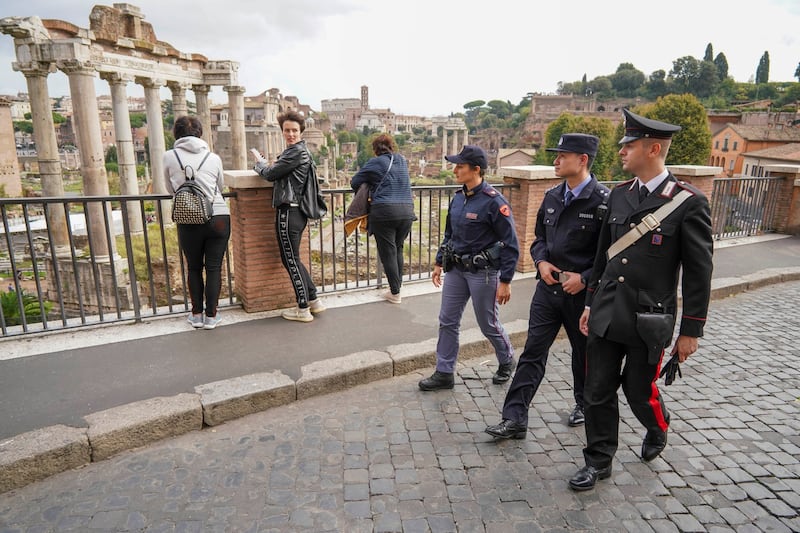Thai officials are divided over a potential plan to allow Chinese police to be stationed in Thailand to boost confidence among tourists from the world’s No. 2 economy about whether the kingdom is safe to visit.
Although the nation's police chief has expressed misgivings about this possibility, other government officials are talking about it as a way to appease Chinese tourists' fears about public safety here. There has been a spate of kidnap-for-ransom cases and reports of people being tricked into being trafficked as workers at scam call centers in nearby Myanmar.
“We have been in discussions with the Chinese embassy about a patrol project bringing Chinese police to Thailand and stationing them at major tourist destinations,” Tourism Authority of Thailand (TAT) Gov. Thapanee Kiatphaibool said on Sunday.
Thapanee spoke after Prime Minister Srettha Thavisin met with the Tourist Police Bureau, the Central Investigation Bureau and tourism officials to discuss the plan as a solution for reviving arrivals of Chinese tourists.
China is the top source of foreign visitors for Thailand’s all-important tourism industry, which was ravaged during the COVID-19 pandemic. Lately, Srettha’s government waived fees for visas for Chinese tourists, but the numbers coming from China have remained relatively low.
“We want to show Thai citizens and Chinese tourists how we are improving safety measures,” Thapanee said, adding the program could be similar to joint patrols in Italy.
Gen. Torsak Sukvimol, the national police chief, pushed back against the proposal.
“I disagree with the import of Chinese police to take care of their tourists, it’s a breach of sovereignty. The Thai police have the potential to keep Thai citizens and Chinese tourists safe,” Torsak said Monday after meeting with the Parliamentary Committee on Police Affairs.
Chinese tourists accounted for a quarter of nearly 40 million tourist arrivals in 2019, before the pandemic hit. Thailand expects between 4 million and 4.4 million Chinese visitors this year, the TAT governor said.
‘Chinese criminals don’t fear Thai cops’
Thai government spokesman Chai Watcharong clarified that Chinese police would act only as liaison officers.
“The Chinese police will not go on patrol but feed information. It has nothing to do with sovereignty but what is most beneficial for the country,” spokesman Chai Watcharong said on Monday while traveling with Srettha to the APEC summit in San Francisco.
“Chinese criminals don’t fear Thai cops but their own state police. Chinese tourists feel more assured if their Chinese police could help take care of them if they are harassed by Chinese criminals,” Chai said. “So Thai police will think of having Chinese police as liaison officers.”
Torsak noted that Thai police had allowed foreign volunteers to assist local police as translators in Pattaya, a major tourist destination for Chinese, Russians and Indians that has a high crime rate.
Specific details about the number of Chinese police who would be deployed were not released.

The proposal comes on the heels of a September 2022 report from the Spain-based Safeguard Defenders group that found China was carrying out transnational policing operations across five continents.
The report said the operations “eschew official bilateral police and judicial cooperation and violate the international rule of law, and may violate the territorial integrity of third countries involved in setting up a parallel policing mechanism using illegal methods.”
An activist, meanwhile, raised concerns about the plan.
"We are too eager to entice Chinese tourists. We should consider a proper policy in order to spur the economy and not focus on pleasing one specific nation," Puttanee Kangkun, a human rights activist and the director at The Fort, an affiliate organization of Fortify Rights, told BenarNews, an RFA-affiliated online news service.
She said it would be hard to predict potential negative effects by allowing Chinese police to be staioned in Thailand.
“We have to seriously consider the consequences – pros and cons. As well, how they could coordinate the operation? Who is the authority,” she asked.
A businessman, Kavin Silpasakul, 37, also questioned the proposal.
“Personally, I don’t have any problems with Chinese tourists, but I don’t agree with allowing Chinese police to be on patrol here,” he told BenarNews. “We may see that as a violation of our sovereignty.”
The TAT and other Thai officials were expected to discuss the proposal with the Chinese embassy on Wednesday. On Monday, a parliamentary committee on security affairs said its members would seek a written policy to ensure clarity and transparency following that meeting.
BenarNews is an RFA-affiliated news service.
